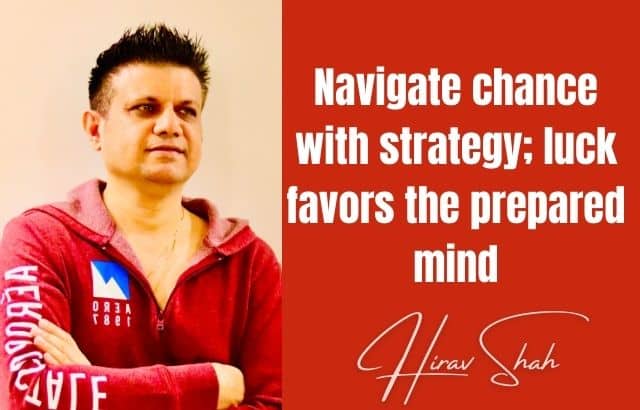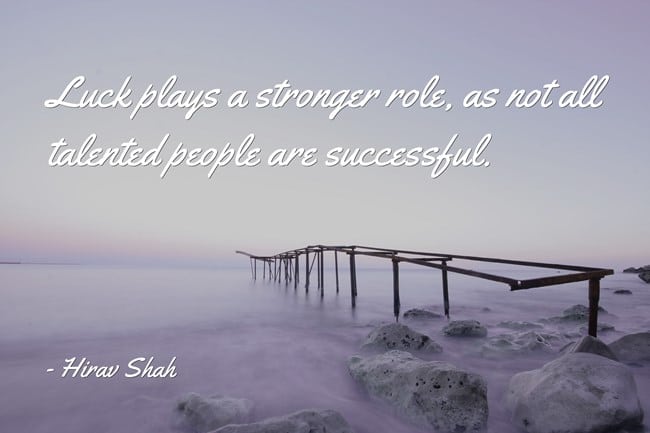Business Transformation: Luck in business plays a stronger tole as not all talented people are successful. You may begin wondering if you are failing. Despite the fact that you are working hard and working smart, applying all your skills and knowledge to grow the business, you are still coming up short. You are a talented and intelligent person but not achieving your full potential.
Lets Say, If the structure of the organization is Astrologically correct, whatever you plan and execute strategy for that particular company, it helps to go through easily.
In Business, Talent alone cannot take you to the height of success.
I feel very bad when I see a person has huge potential and still not having that much money in his account…or not having success as per potential and one of the BIG reasons behind it is they are lacking Luck, says Business Astrologer™ and Astro Strategist Hirav Shah.
Table of Contents
Luck in Business plays a stronger role, as not all talented people are successful.

● “Act” and “React” both are very important ingredients for any business.
● Combinations of Mindset, Strategy, Implementation, and LUCK can make you more successful
● Business strategy is the combination of When, where, what and how to act and react
● There are mainly 12 Zodiac Signs, 12 houses in Horoscope, 12 months, 7 days, 7 Main planets and 2 Shadow planets (Rahu and Ketu). All planets are good, all planets show some movement every day.
● The Point is how to utilize and to make & execute strategies with planets’ movement to create opportunities for business and for making the future better.
Why earn less when you have potential to make more?
Formula For Success and How Luck plays an important role in Business
- I strongly feel that Success is the combination of Hard work, Smart work, Talent, and Luck and all are multiplied with each other so if any of these factors are zero, then you will have zero success!
- Success in Business is 80% combination of Hard Work, Mindset, Strategy, Effective Execution & Talent
- And of course 20% is a Luck factor.
- Right TIME with Right STRATEGY helps to execute strategies effectively.
There may be many reasons for getting not up to the mark in Business.
● It may be you are not properly doing smart work when luck is favoring, or
● When you are doing smart work, luck is not favored.
● I believe that every one of the virtues of success in the world is ineffective without one key ingredient: LUCK
● But in the same way I also strongly believe that if you combine luck or Astro Science with strategies you may get tremendous results.
To achieve success you need to have the proper mindset, proper strategy, implementation plan and Grace of God or LUCK, says Business Transformation Expert Hirav Shah.
What is luck in Business? How to tap the full potential of the company ?

If the structure of the organisation is Astrological correct, whatever you plan and execute strategy for that particular company, it helps to go through easily, explains Hirav Shah.
Lets understand how luck works in Business
● How does food taste without salt ?
● How will a movie perform with a weak script ?
● How do you feel wearing ill-fitting clothes ?
● How does a track & field athlete feel if the track has a poor surface?
Similarly, in business, if the structure of the organisation is Astrological correct, so whatever you plan and execute strategy in terms of Business ROI, Profit, Sales, Marketing, Advertising, Branding, Image Building, Acquisition, Diversification, Exit Strategy and so on for that particular company, it helps to go through easily.
Below are the 9 things that help you to make the Structure of the Company or Organisation Astrological correct to tap the full potential of the company.
1. Company Name,
2. Brand Name,
3. Combination of Partners, Percentage of Shares
4. Correct registered and administrative address,
5. Logo,
6. Web Presence
7. Print Presence
8. Digital Presence (Email, PowerPoint Presentation, Brand Story, Any digital Communication material etc)
9. Right Roles to Key People at Right Time.
I strongly believe that for any business to realise its full potential then it must check all above-mentioned 9 critical aspects of the structure of the organisation, says Hirav Shah.
- There should be proper balancing for that particular company, which can help your business strategy to go through very easily.
- There should be proper alignment for that particular company, which can help your business strategy to tap full potential and also to go through very easily.
- So the point is if the structure of the organisation is Astrological correct, whatever you plan and execute strategy for that particular company, it helps to go through easily.
Luck plays a stronger role, as not all talented people are successful.
It is not that each of the business owners does not have resilience or a winning business strategy. But, out of the three, hardly only one has been lucky to take the plunge at the right time and made the most of the existing economic advantages.
The bottom line is that you can work hard because it is in your control. You can put in the hours and the effort in the hope of taking your business to the next level. But, without luck favoring you, it is impossible for you to achieve huge success. You might just have to settle for relative success.
Its now time for you to Recheck your Name of the company, Branding, Logo, Web, Digital, Print presence, Percentage of partners etc from any Astro Strategist to make sure the company structure should Astrological Correct to tap the full potential of that particular company, says Hirav Shah.
Why live an OK life…why not an excellent life ?














